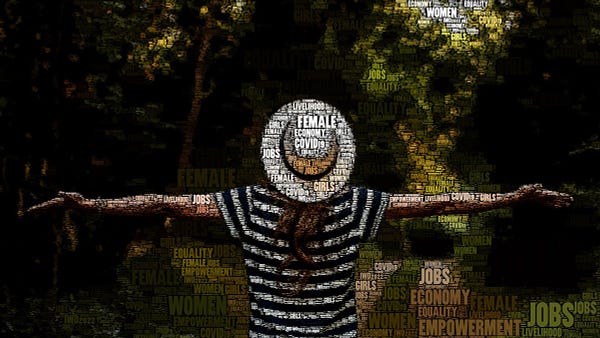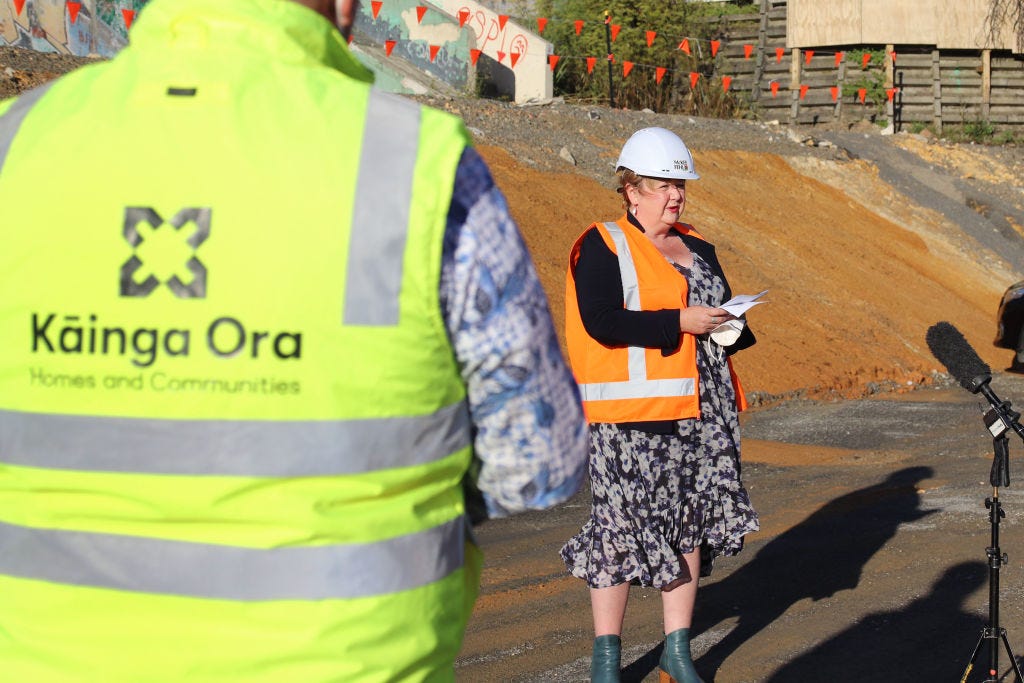TLDR & TLDL: A review group the Government hopes will ‘calm the farm’ over the Three Waters backlash from most councils has recommended councils be given shares in the four proposed water entities. (Read my analysis below about why it doesn’t deal with the underlying problem with Three Waters: it is a fudge to avoid a proper debate about public debt and migration.)
Meanwhile, pressure is building on Housing Minister Megan Woods to clear out the leadership of Kāinga Ora after the revelation of another embarrassing email from CEO Andrew McKenzie downplaying the seriousness of its paid promotional article about a Labour candidate.
Elsewhere in the news this morning:
the US and UK announced their own embargoes on Russian oil and gas, moving independently of Europe, which is much more dependent on imports;
Brent crude firmed to US$126/barrel and European gas prices gyrated wildly after Russia threatened to cut its supplies to Europe and after a senior Russian minister warned embargoes could push oil to US$300/barrel; and,
the European Union indicated it would borrow heavily to pay for massive new energy and defence spending, which drove the German 10 year bund yield up 13 basis points to 0.11% and was a factor lifting the US 10 Year Treasury yield by nine basis points to 1.86% this morning.
The latest Three Waters revival fudge
The latest proposal to tweak Three Waters to win back some of the disillusioned Councils and keep a lid on the provincial backlash is back in.
DIA’s Working Group on Representation, Governance and Accountability of new Water Services Entities (website) released its report for Nanaia Mahuta this morning, including a plan to offer councils ‘shares’ in the proposed four water entities that they can use to block any attempts at privatisation, but nothing else.
The group proposes that councils get one share for every 50,000 people in the water entity and can use it to block any attempt by other councils to privatise the assets. But the shares can’t be used to block decisions by the entities to impose water charges, to invest in particular assets or to raise debt.
I don’t think this will calm many of the complaints and fears of more than three quarters of the councils and mayors who oppose it, including Phil Goff, who asked for his dissenting opinion to be included.
In my view, the entire Three Waters process is a fudge to deal with two optics problems that shouldn’t be a problem if only both major parties, councils (and Treasury in particular) would have realistic conversations and take a modern approach to public debt and migration planning.
Three Waters is designed to structure the nation’s water assets so they can bear the $150b of public debt needed to fund 20-30 years of remedial infrastructure work in their own right outside of ‘core crown debt’ held by the Government. The four entities are being extracted out of council assets to take the vexed issue of water chargers and water meters out of the hands of anti-rates-campaigning councillors and mayors. It would have been much faster and more efficient, and a lot less politically painful in the end, for either councils or the Government to take that debt onto their own balance sheets. Councils and both major parties should just have been upfront about the need for higher public debt to both catch up on past under-investment and to improve water quality, along with dealing with a likely continuation of fast population growth.
All because migration and higher debt can’t be talked about in public
But it would have meant having hard public conversations about having higher public debt levels to GDP than is currently the case and taking a collective view on what population growth levels we want as a nation and will pay for.
Aside from the broad reluctance to talk in public about what migration levels we want and why, this is all because of the now-embarrassing and out-of-date obsession with keeping net core crown debt around 20-30% of GDP. This obsession currently also means Auckland Council (in particular) can’t run higher debt levels relative to income or have a lower credit rating. So the ‘solution’ being used for Three Waters, as well as for Kainga Ora and Waka Kotahi, is to create new ‘off balance sheet’ vehicles that carve off specific assets and creates new dedicated revenue streams to fund the debt on those assets.
All so Treasury and our political mainstream can tell themselves and a public that is supposedly paranoid about rising public debt that they aren’t increasing debt. The wider Government sector clearly is, and should, be increasing debt. That’s the most efficient and fairest way to fund these long-term public assets. The failure to properly invest in public infrastructure to prepare for (or just plain cope with) 1-2% population growth over the last 20 years is foundational to most of our problems.
A much simpler solution would have been for both Government and councils to plan the $150b of spending needed over the next 20-30 years and agree a fair split of which balance sheets should have which debt and then just raise the money.
Who is everyone kidding?
I don’t know who the Government or the Councils think they are kidding. The ratings agencies? They can see all this and are happy to take the fees from whoever is borrowing and know there is monstrous demand for this debt globally.
All this is doing is increasing the likely debt costs by layering in unnecessary margins to core crown debt. It is a tragedy of the political economy that 30 years of scaremongering about public debt has led to the unintended consequence of Three Waters becoming lumped in with a general provincial backlash against Government that includes issues as unrelated and peripheral as the ‘Ute tax’, water quality standards, RMA reform and an ugly scare campaign about iwi ‘taking’ water assets ‘back’ by stealth.
Now we’ll see whether Nanaia Mahuta wants to take up the ‘shares’ option and whether councils think it changes the landscape. I doubt it will and now the Government, if it pushes ahead with this, faces the ugly prospect of the provincial backlash overlapping with council elections in October that install Trumpy councillors and mayors who want to upend all the (mostly) good work being done around housing, climate change and infrastructure reform.
All because the Government and councils are scared of talking honestly about public debt and migration.
A maelstrom that is not passing quickly
Nicola Willis continued yesterday to pick away in Parliament at the scab of Kainga Ora’s puff piece problem and found another example of CEO Andrew McKenzie appearing to downplay the issue in emails. (Hansard of Question 7 in Parliament yesterday, Willis’ statement and coverage in NZ Herald from Michael Neilson and in Stuff from Thomas Manch. Here’s the full OIA response of the email trail.
Here’s the key excerpt from an email from McKenzie to a staffer about questions over a Kainga Ora promotional article for NZ Herald’s OneRoof that sparked a Public Service Commission investigation and rebuke for the CEO and chair Vui Mark Gosche.
“As I am sure you will have been told, the judgment call you made was fine. I am happy to stand behind you on it. This little maelstrom will pass quickly. I just hope it doesn't make you too risk averse!” Andrew McKenzie in an internal email.
It’s not passing quickly and Megan Woods clearly has Kainga Ora’s senior leadership on notice.
“I expect Kāinga Ora to improve the culture of understanding of how it is part of the broader Public Service and what that means for staff employed within the organisation. And I will be receiving regular reporting of this work. The chair has indicated to me that he and the board are fully committed to meeting this expectation.” Megan Woods.
But this little kicker at the end of the exchange suggests there is more to come on this. Willis pointed to the relatively fast resignation last year from KO’s board of new outside director Helen O’Sullivan, an experienced property industry executive.
Nicola Willis: Why did Helen O'Sullivan resign from the Kāinga Ora board in November, shortly after these issues became public and just nine months into the job, and does the Minister share my concern that O'Sullivan left because she no longer wanted to be associated with this failing organisation?
Hon Dr MEGAN WOODS: In answer to the second part of the question, I utterly reject the assertion that the member has made. I don't have to make assumptions, because I was told by Helen O'Sullivan herself and communicated also through the chair that she'd accepted another board appointment that was in conflict with her role on the Kāinga Ora board.
Kāinga Ora‘s leadership is now clearly under pressure and in the firing line, with a Minister who is having to answer (and ask) some tough questions in Parliament and behind the scenes. I’ll keep watching this space and welcome any info or tips from readers about KO’s performance.
Scoops this morning and news of note
Cooling market - QV reported its measure of house values shows house price inflation in the three months to February slowed to 2.3% from a quarterly growth rate of 6.1% in the three months to January. This is one of the lagging indicator house price series that tends to downplay what’s happening at the ‘bleeding edge’ of the last month’s data. (Newshub, RNZ)
The data series to watch is the REINZ’s House Price Index, which is the most volatile because it includes the latest sales information for the most recent month, but it is the last of the monthly data series to come out. That shows prices have fallen at least 2.3% in December and January from the peak in November. We should get the REINZ figures early next week.
He said. She said - National is denying Labour’s claim of a ‘fiscal hole’ in the tax cut plan issued over the weekend. Grant Robertson said National had used the wrong Treasury forecasts. National says it didn’t and has only costed the indexation tax cuts.
I’ve written the package isn’t costed properly because it leaves out the other five ‘tax grab’ measures Christopher Luxon pledged on Sunday to reverse and leaves many unanswered questions around those. (Newshub)
Parliamentary exchange of the day
National is focused on the cost of living issue at the moment, as shown in this question (1) reported in Hansard.
CHRISTOPHER LUXON (Leader of the Opposition) (remote) to the Prime Minister: Does she stand by her response when asked if New Zealand has a cost of living crisis that "I wouldn't describe it that way", and is she considering adjusting income tax brackets to help Kiwis struggling with rising prices?
Rt Hon JACINDA ARDERN: I stand by the entirety of the interview, where I stated, "There is an impact that people are feeling undeniably." The debate is not whether inflation has increased and is impacting people. The debate is what we should do about it. The Opposition has proposed cuts to the top tax rate and getting rid of policies to help first-home buyers. We, on the other hand, have worked consistently to increase focused support for low and middle income earners. That's why we've overseen a $5 increase in the minimum wage, benefiting around 300,000 workers. We've increased Working for Families changes that will lead to 346,000 people better off by an average of $20 each a week. We created the winter energy payment, starting again from 1 May, benefiting over a million New Zealanders during the winter months. We made the largest across the board increases in benefit incomes since the 1940s, and we've increased the pay of new police officers by 19 percent since 2017, 16 percent for primary teachers, and 21 percent for new nurses. The Government's plan is providing targeted support to New Zealand families to deal with the costs of living, whilst also investing in critical services and, importantly, keeping a lid on debt.
Christopher Luxon: Why won't she admit that New Zealand has a cost of living crisis when rent is up $140 a week and food prices are up more than 13 percent under Labour?
Rt Hon JACINDA ARDERN: This side of the House absolutely acknowledges the increases that families across New Zealand are currently experiencing—as many other countries are—as we see the COVID recovery mean that demand is often outstripping supply. We also have the issue, of course, of the pressure on fuel prices, which have gone up over 500 percent since April 2020 in terms of a barrel of crude oil. That is having an impact. But what I would contend is that the National Party's proposal, for instance, to take away essentially $26 per week from someone earning under $40,000—because they voted against our increases to the family tax credit—and instead replace it with $2.15 is simply not the way to support families who need it most.
Useful longer reads




Threads of the day



Spookies, profundities, curiousities and feel-goods
A fun thing

Ka kite ano
Bernard





















The real reason Three Waters is bogged down (and it's not the one you probably think)